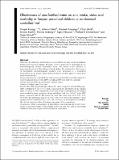| dc.contributor.author | Prosper Kujinga, Valeria Galetti, Elizabeth Onyango, Viktor Jakab, Simone Buerkli, Pauline Andang’o, Inge D Brouwer, Michael B Zimmermann, Diego Moretti | |
| dc.date.accessioned | 2020-08-14T07:34:15Z | |
| dc.date.available | 2020-08-14T07:34:15Z | |
| dc.date.issued | 2018-10 | |
| dc.identifier.uri | https://repository.maseno.ac.ke/handle/123456789/2108 | |
| dc.description.abstract | Objective
Zn deficiency and diarrhoea are prevalent and may coexist in children living in low-resource settings. Recently, a novel approach for delivering Zn via microbiologically treated, Zn-fortified water was shown to be effective in improving Zn status in West African schoolchildren. We assessed the effectiveness of Zn-fortified, microbiologically purified water delivered as a household intervention on Zn intake, status and morbidity in children aged 2–6 years from rural western Kenya.
Design
Randomised controlled trial. Intervention included households assigned to water treatment device with (ZFW) or without (FW) Zn delivery capability
Setting
Rural households in Kisumu, western Kenya.
Subjects
Children aged 2–6 years.
Results
The ZFW group had higher dietary Zn intake compared with the FW group. ZFW contributed 36 and 31 % of daily requirements for absorbable Zn in children aged 2–3 and 4–6 years … | en_US |
| dc.publisher | Cambridge University Press | en_US |
| dc.subject | Zinc, water fortification, morbidity, plasma zinc concentration, pre -school children. | en_US |
| dc.title | Effectiveness of zinc-fortified water on zinc intake, status and morbidity in Kenyan pre-school children: a randomised controlled trial | en_US |
| dc.type | Article | en_US |

